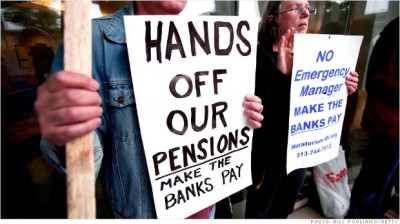Detroit Ruling Sparks Nationwide Attack on Working Class: Illinois Legislature Passes Bill to Cut Pensions

In a special session on Tuesday, the Illinois legislature passed a long-anticipated bipartisan pension “reform” bill that slashes pension benefits in response to the estimated $100 billion in unfunded state liabilities.
The agreement was reached over the Thanksgiving holiday by the four Democratic and Republican leaders of the House and Senate. The bill passed 62-53 in the State House of Representatives and 30-24 in the State Senate.
The timing of the December 3 special session was important, as the vote was taken just hours after federal bankruptcy court judge Steven Rhodes read his ruling on the bankruptcy of the city of Detroit. In addition to letting the bankruptcy proceed, Rhodes explicitly ruled that federal bankruptcy law trumps state constitutional protections for worker pensions.
Rhodes’ decision is aimed at setting a precedent to allow for the looting of state and municipal pension funds, worth trillions of dollars.
By raising the retirement age by five years for workers currently under 45, capping the salary on which pensions are based to $110,000, and lowering and/or canceling cost of living (COLA) increases to retirees, the bill aims to save $160 billion over 30 years. Lawmakers claim that this will leave the pension system fully funded by 2044. Workers will also pay 1 percent less into the funds.
In Illinois, as in Michigan, the plan to restructure pensions moves ahead in violation of the state Constitution. Article 13 of the Constitution states, “Membership in any pension or retirement system of the State, any unit of local government or school district, or any agency or instrumentality thereof, shall be an enforceable contractual relationship, the benefits of which shall not be diminished or impaired.”
In recognition of this, Illinois Senate President John Cullerton, a Democrat, in an alternate bill proposed earlier this year, offered “consideration” to some retirees who will have their pensions cut. However, since the start of the Detroit bankruptcy court proceedings, Cullerton changed his position.
The aggressive push to “reform” pensions in Illinois has been led by the Democratic Party. “We cannot continue to be the embarrassment of the nation,” said Democratic Senator Kwame Raoul, speaking in support of the bill in floor debate December 3. Raoul sponsored the bill in the Senate with fellow Democrats Mike Madigan, Elaine Nekritz, and Daniel Biss.
Governer Pat Quinn repeated the lie that the reduction of retiree incomes serves the common good. Immediately after its passage, Quinn promised to promptly sign the bill, stating, “When I took office…we inherited a lot of challenges and problems, and pension reform was the number one challenge…I look forward to signing this pension reform. It’s important that we understand that action of the General Assembly, in a bipartisan way, will make the state stronger and the people stronger…advancing the interest of the common good, of everyday people.”
Nowhere in the official media is it acknowledged that the Illinois pension crisis is manufactured. Retirees and current workers are being forced to pay for decisions they played no part in making, having been in no way responsible for the “pension holidays” Democratic and Republican leaders took from making contractually obligated payments.
The Illinois state pension system includes state employees, downstate teachers, university employees, the General Assembly retirement system, and the judges retirement system. Those currently covered or contributing to the Illinois state pensions are reported to make up 5.3 percent of the state’s population, or 678,000 people.
Retirees currently receiving pensions will be affected. With the exception of state employees, Illinois pensioners do not draw federal Social Security benefits.
The bill has been lauded by business interests, including Crain’ s Chicago Business and the Commercial Club’s Ty Fahner. “This bill isn’t perfect,” Fahner said, “and it wasn’t without compromise, but it was undoubtedly the right thing to do for the state and its citizens.” Chicago mayor Rahm Emanuel also applauded the bill, noting that it laid the ground for the pension cuts needed in Chicago and other municipalities.
In anticipation of popular opposition, a coordinated media campaign has sought to pit younger workers against their elders, reaching an apex last November shortly after the unions shut down the 2012 Chicago teachers strike and the governor rolled out the “Squeezy the Pension Python” campaign. Credit ratings agencies, including Moody’s and Standard and Poor’s, have downgraded both the state’s and state agencies’ credit ratings in an effort to accelerate the pension cuts.
Through the We Are One Illinois coalition—made up of the Illinois AFL-CIO, IEA, AFSCME, SEIU, Teamsters, state nurses association, firefighters and police unions—the unions worked with Cullerton on an alternate pension “reform” bill. Since the successful passage of the test-case pension “reform,” that affecting Chicago Park District workers, the unions have done absolutely nothing to stop the passage of the Senate bill, aside from threatening a legal action.
We Are One issued a tepid appeal to Quinn to change his mind, “A majority of legislators ignored and defied their oaths of office today—but Governor Pat Quinn doesn’t have to. He can stay true to his oath and the legal promise made to public employees and retirees by vetoing this unfair, unconstitutional bill. If he doesn’t, our union coalition will have no choice but to seek to uphold the Illinois Constitution and protect workers’ life savings through legal action.”
In fact, the unions in Illinois, as in Detroit, fully support the attack on the working class and are committed both to their political alliance with the Democratic Party and their defense of the capitalist system.

